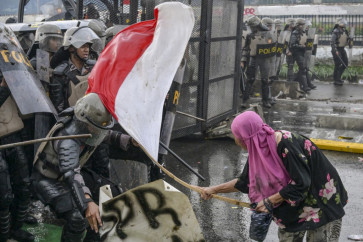Popular Reads
Top Results
Can't find what you're looking for?
View all search resultsPopular Reads
Top Results
Can't find what you're looking for?
View all search resultsInsight: DBS-Danamon: A private national bank owned by a foreign bank?
DBS’ US$7
Change text size
Gift Premium Articles
to Anyone
D
BS’ US$7.3 billion acquisition of Bank Danamon from its shareholder, the Singapore government’s investment company Temasek, will undoubtedly test the political skill and regulatory role of Bank Indonesia (BI).
The Indonesian central bank will have to balance its role of protecting its regulatory framework credibility and its political commitment to the House of Representatives.
On July 22, 2010, during the fit and proper test of Darmin Nasution before being selected as Bank Indonesia governor, he signed nine points of political commitment with the House. Notable was point no. 6 of this political commitment: “Strive to ensure the national bank will become the master of its own house without foreign control and strive to push for reciprocity with other banking systems”.
The common perception is that the Indonesian banking sector is too liberal compared to our neighboring countries. This could be a legacy of Asian financial crisis where the central bank school of thought is driven by a need of foreign capital to recapitalize its ailing banking sector.
The DBS-Danamon deal is just a trigger point of confusion created by BI’s oxymoron categorization of a private national bank controlled by a foreign bank. Last year, Bank Indonesia rejected three acquisitions by foreigners: Bank Ina Perdana by Affin Holdings, Bank Mestika Dharma by RHB Capital and Bank Maspion by the China Construction Bank.
In Indonesia, there are four categories of bank: state-owned, private national, joint-venture and branches of foreign banks. Danamon falls in the category of private national bank. DBS, meanwhile, falls under the category of joint-venture bank.
However, post the Asian financial crisis, this distinction has become blurred; several private national banks are now controlled by foreign banks: BII is controlled by MayBank (Malaysia), Niaga by CIMB (Malaysia), NISP by OCBC (Singapore) and Buana by UOB (Singapore).
So DBS-Danamon just adds to the confusing categorization of Indonesian banks. Bank Indonesia’s lack of clarity in respect of bank categories adds to the confusion among market players.
When the House and the governor of the central bank signed a political commitment that the BI governor would strive to ensure national banks would become the masters of their own houses — were they referring to only state-owned banks and private national banks, in which the majority ownership is controlled by Indonesians, or did it include private national banks, which are controlled by foreign banks? The definition of private national banks controlled by foreign banks sounds like an oxymoron — or contradiction — to me.
By definition, a private national bank is a bank controlled by the private sector and by Indonesian nationality. The moment the bank is acquired by a foreign entity it should cease to be categorized as a private national bank. It should be categorized either as a joint-venture bank or a foreign bank. In a country where nationalism runs high, this oxymoron term continues to flourish and creates much confusion.
There are several policy options for BI. First, the central bank clarifies and recategorizes all private national banks controlled by foreign banks as a distinct category. Second, it keeps the current “oxymoron” system intact and creates unnecessary confusion. Third, BI should clarify its stance on the ownership rule of the banking sector.
Berating DBS for attempting to acquire Danamon on the basis of reciprocity is like barking up the wrong tree. DBS is not the monetary authority of Singapore and, therefore, it is not in its power to decide whether it can ease the regulatory requirement for Indonesian banks to operate in Singapore. What Indonesia can do is get its act together by requiring BI to clarify its stance on the issue over the role of foreign banks in Indonesia.
To avoid confusion, it is high time for BI to provide clarity on its stance on private national banks owned by foreign banks, before it approves the Danamon-DBS transaction.
Just because BI has created confusion by not changing the category of private national banks that are controlled by foreign banks such as CIMB-Niaga, OCBC-NISP, UOB-Buana, it does not mean it can repeat the same mistake by allowing confusion to rein.
Foreign-controlled private national banks should be categorized either as joint-venture banks or foreign-controlled banks. They should not be put under the term of private national banks.
If the objective of the nation is to make national banks masters of their own houses, this should be based on a sound regulatory framework formulated by banking regulations and not just based on an ad-hoc policy to yield to political pressure.
The oxymoron of private national banks being controlled by foreign banks should be abolished. The current banking law allows foreigners to participate in the Indonesian banking sector and we should not hinder them from doing
business according to our own regulations.
The debate on DBS-Danamon and the reciprocity issue is not as complicated as it seems. What is complicated is the stand of the central bank, which tries to please everyone — both bankers and politicians — and is not able to clearly define the roles of state banks, private national banks and foreign banks. It is advisable for BI to adopt KISS (Keep It Simple and Stupid) principles in the categorization of Indonesian banks.
The writer is the founder of the Independent Research & Advisory Indonesia.










